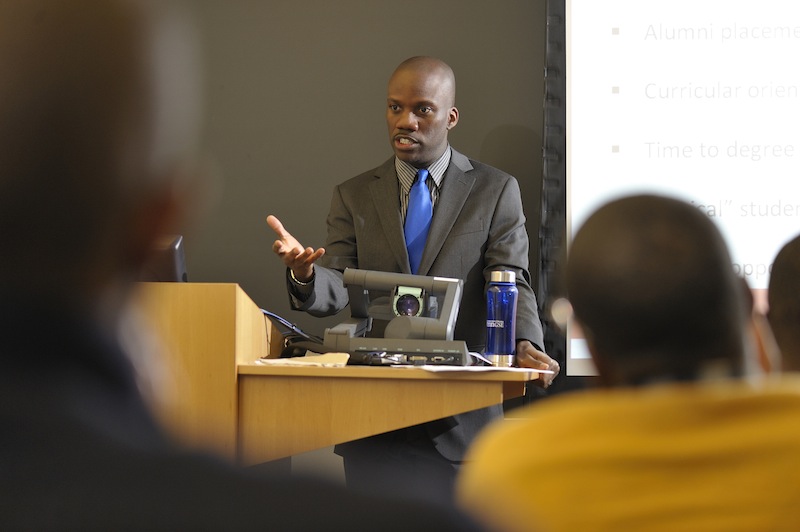Shaun Harper leading new national initiative to help boys and men of color succeed

Shaun Harper has been chosen to co-direct a new national initiative to help boys and men of color thrive at every stage of life, backed by donors including The Atlantic Philanthropies, W.K. Kellogg Foundation, and Annie E. Casey Foundation.
Rise (Research, Integration, Strategy and Evaluation) for Boys and Men of Color will identify and better understand the strategies that will ultimately improve life outcomes for boys and men of color. The collaborative will focus on four areas — education, health, criminal justice, and economic opportunity and workforce development — with an aim to develop best practices, inspire new research, and bring together academics and policy makers to improve communities.
Harper, the founding executive director of Penn GSE’s Center for Race & Equity in Education, has built his career studying pathways to success for Black and Latino males, and finding ways to widen those pathways. RISE represents a continuation of that work.
“This collaborative project affords us a powerful opportunity to more effectively leverage our collective expertise to improve policies, practices and conditions for boys and men of color,” Harper said.
Harper will co-direct RISE with Sharon Norris-Shelton of Equal Measure, a national evaluation and philanthropic services firm working to advance diversity, equity and inclusion throughout its 30 years of influence in the social sector. RISE emerges as an extension of the Executives’ Alliance (EA) to Expand Opportunities for Boys and Men of Color and builds on the recent momentum of numerous institutions and organizations committed to these issues. The Atlantic Philanthropies, W.K. Kellogg Foundation, and Annie E. Casey Foundation have agreed to invest $8.5 million into this $10 million three-year collaborative.
RISE’s key initiatives include:
- More effectively networking and convening researchers, evaluators, practitioners and community activists to share knowledge.
- Funding/sponsoring new research and evaluation projects that identify solutions to challenges faced by communities of color, especially boys and men of color.
- Building an easily accessible web-based portal to house research, tools and reports that support ongoing cross-sector dialogue and establish a virtual community of practice.
- Expanding the reach and dissemination of knowledge, best practices and policy recommendations that result from the effort with the field of researchers, policymakers, practitioners and community stakeholders in an effort to shift the delivery of supports to boys and men of color.
Unfortunately, Harper said, researchers and community leaders working to promote boys and men of color often do so in silos. By not communicating the latest theory, finding, or experience with one another, outdated ideas can persist. Too often, these ideas are based in a deficit narrative suggesting these boys and men are a problem to be fixed. By building a wide network of researchers and stakeholders, RISE will actively work to end that stereotype.
“Developing an interdisciplinary network of scholars, evaluators, practitioners and policy shapers is critical to the effort’s success,” said Norris-Shelton. “This professional network will establish a joint agenda for research, evaluation, effective practice and policy advocacy, and will be poised to make a significant difference in improving the lives of boys and men of color.”
RISE is identifying additional partners who will play critical roles in advancing the overall mission and objectives of the collaboration. This group will represent several professional sectors, serve as a voice for various racial/ethnic populations, and play a strategic role in the collaborative.
“This is a bold effort to address racial disparities in a coordinated, strategic way,” said Christopher G. Oechsli, president and CEO of The Atlantic Philanthropies. “By using evidence and evaluation to inform actionable policy, RISE will help to dismantle the unfair obstacles to opportunity and equality that disproportionately impact not only young men of color, but entire communities.”
